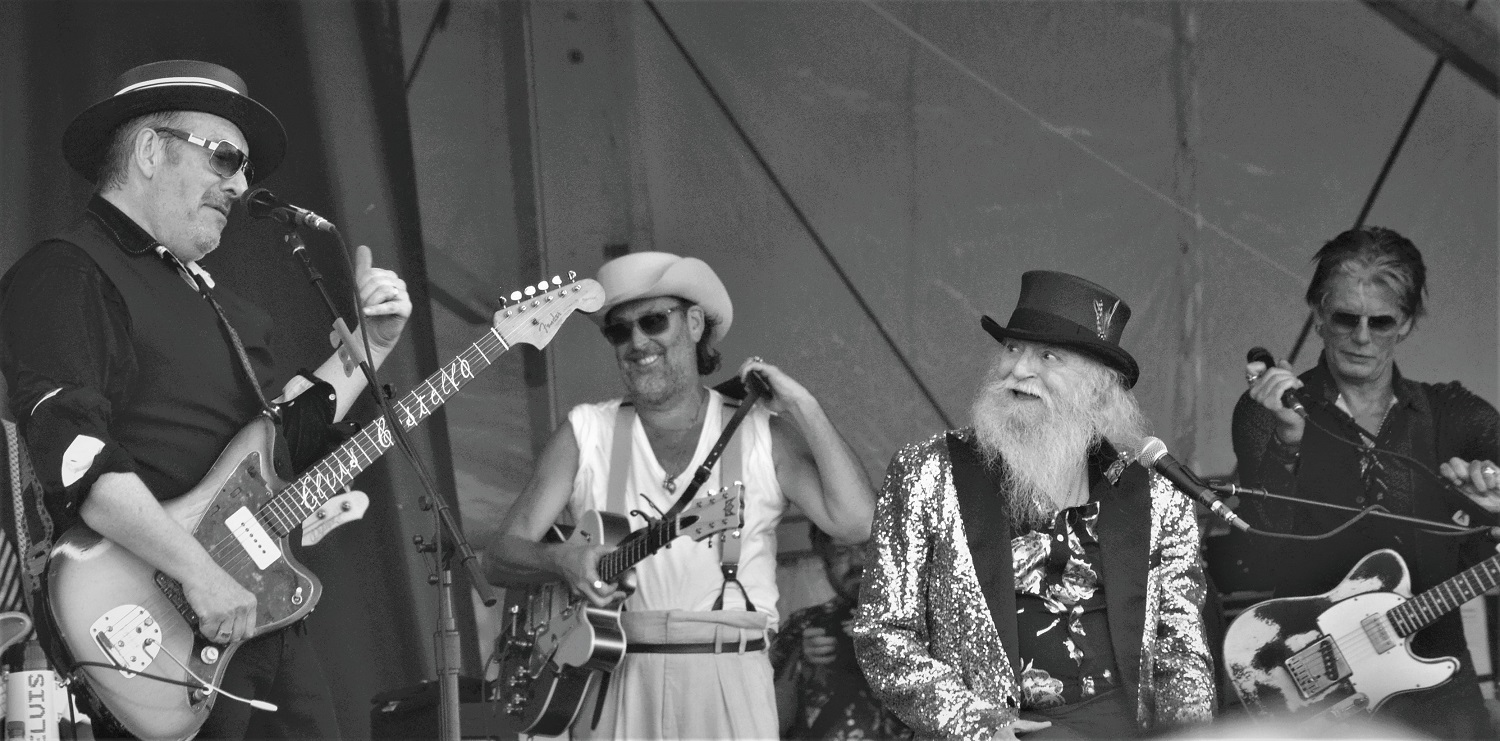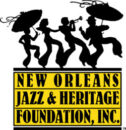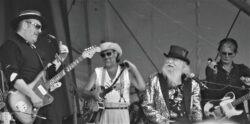A Fearless Creator of Fresh Material
Tommy McLain’s late-career classic
Published: August 31, 2022
Last Updated: May 11, 2023

Photo by Dylan James Stansbury, No Access Photos
From left: Elvis Costello, C. C. Adcock, Tommy McLain, and Charlie Sexton at the 2022 New Orleans Jazz and Heritage Festival.
Tommy McLain is generally regarded as a swamp-pop singer, and swamp pop is generally regarded as a South Louisiana blend of early rock and classic rhythm and blues, along with tinges of Cajun music, zydeco, and country. In terms of song structure, much swamp pop is identical to the repertoire of such icons as Fats Domino, whose beloved best-sellers became swamp-pop favorites. What sets swamp pop apart from these other genres, then, somewhat intangibly, is its intense approach to vocals, plus the occasional number sung in French. This plaintive passion is heard on timeless songs by McLain and colleagues, including Warren Storm, Johnnie Allan, Rod Bernard, Bobby Charles, Little Bob, Phil Phillips, and Belton Richard.
While the state’s southern French-speaking enclaves are considered swamp pop’s home turf, Tommy McLain hails from Jonesville, in central Louisiana’s Catahoula Parish, where English is the native tongue. In another departure from commonly held perceptions, “Sweet Dreams”—McLain’s huge national hit from 1966—is lauded today as a swamp-pop anthem. But when “Sweet Dreams” was riding high on America’s Top 40 radio, the idea of “swamp pop”—and the term itself—didn’t exist. A journalist coined this phrase in the ’70s, as a retroactive descriptor for records from the ’50s and ’60s. His aptly evocative locution resonated with this music’s practitioners, and “swamp pop” took root in Louisiana’s cultural lexicon.
The first music that Tommy McLain heard, as a child, was a blend of “Pentecostal hymns, and country . . . and then,” he told this writer—with the charismatic zeal of a born raconteur who never tires of recounting his saga—“I got into rhythm and blues. Little Richard was a huge influence, he really set me on fire! I had Fats Domino embedded into my soul!” “Sweet Dreams” was first conceived as a country song—which scored a hit for its writer, Don Gibson, in 1960, and again for Patsy Cline in 1963—but McLain interpreted it with a rhythm and blues feel and instrumentation. The success of his rendition put McLain on cross-country tours with such diverse ’60s chart-toppers as the Byrds, Gary Lewis and the Playboys, Bobby Vinton, the Yardbirds, and Otis Redding. When this momentum eventually subsided, McLain settled into decades of playing nightclubs around Louisiana and Texas, working six nights a week with such top musicians as the bilingual Tex-Mex singer Freddy Fender, and the storied “blue eyed soul” band the Boogie Kings.
In the late ’80s, Tommy McLain met the producer, songwriter, and guitarist C. C. Adcock. Despite an age gap of three decades, the two bonded in their perception of swamp pop as vibrant and ever-evolving music, rather than nostalgia preserved in amber. Adcock is a leading figure in re-popularizing swamp pop—both the music and that term for it—as the founder of the retro/futuristic Lil’ Band o’ Gold. While this aggregation was Adcock’s sole and intensive focus for years, he longed, all the while, to produce a solo album by McLain.
“What separates Tommy from the other swamp-pop stars and their fans,” Adcock commented, “is that [the rest of them] are totally happy to just stick with the classic hits.” To this day, it is a fascinating and endearing time-warp experience to go to swamp-pop dances where every song performed is at least fifty years old. But McLain and Adcock’s forward-thinking approach is essential to swamp pop’s ongoing growth.
“Tommy is a fearless creator,” Adcock said. “He just keeps coming up with great fresh material.” With equal parts pride and poignance, McLain added, “I wish my mom and dad could’ve heard this new music that I’m making. They got to see me have success with ‘Sweet Dreams’—but I didn’t write ‘Sweet Dreams.’ I have something to say too. This new album is me, creating at my full potential—it is swamp pop, but we didn’t just rehash the old favorites.”
The presence of marquee admirers such as Elvis Costello will introduce McLain and this album to a vast new audience, which could dramatically energize his career. When promoting elderly, lesser-known musicians who play older styles, it can be quite effective, in terms of garnering media attention, to feature younger, simpatico artists with greater name-recognition who can help them reach younger listeners (as this writer did when producing the Hackberry Ramblers’ final albums).
Tommy McLain has long lost the soaring vocal range that electrified “Sweet Dreams” in 1966. But even with reduced aural parameters, McLain remains a highly effective, affecting, and soulful singer. Instead of youthful pyrotechnics, McLain now projects wisdom, introspection, and vulnerability, via an exquisitely understated sense of phrasing that savors every word and makes dramatic use of silent pauses. This approach is all the more convincing in that McLain is recounting his own life story:
“I remember a long time ago, records sent me reeling.
Falling in and out of love—music, it kept interfering.”
I Ran Down Every Dream also stands out as Tommy McLain’s best-produced album, by far. “I wanted to make a more high-fidelity snapshot of my hero Tommy than on some of his previous recordings,” Adcock reflects. “I wanted a sound that was sparse, but still lush and finessed—mysterious and captivating upon repeated listens, the way that classic records are.” Adcock has admirably achieved this goal, and Tommy McLain is ecstatic.
“I’m really excited about this album,” McLain concluded. “And it feels wonderful to be back in the business, travel to do shows, do interviews, all of it—that exhilaration never goes away!”
Ben Sandmel is a New Orleans–based writer, folklorist, and producer. The former drummer for the Grammy-nominated Cajun/country band The Hackberry Ramblers, Sandmel is also the author of Ernie K-Doe: The R&B Emperor of New Orleans. In May 2018, the LEH honored Sandmel with an award for his Lifetime Contributions to the Humanities. In August 2021, Sandmel graduated from Tulane University with an MA in musicology.

Sound Advice is funded in part by a grant from the New Orleans Jazz & Heritage Foundation.
